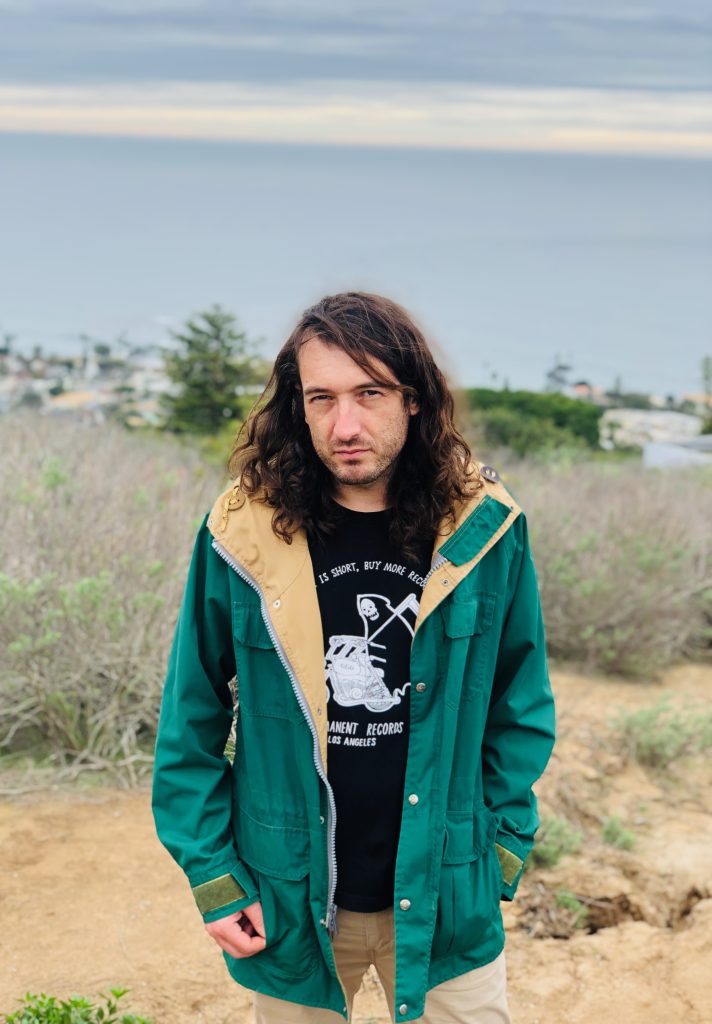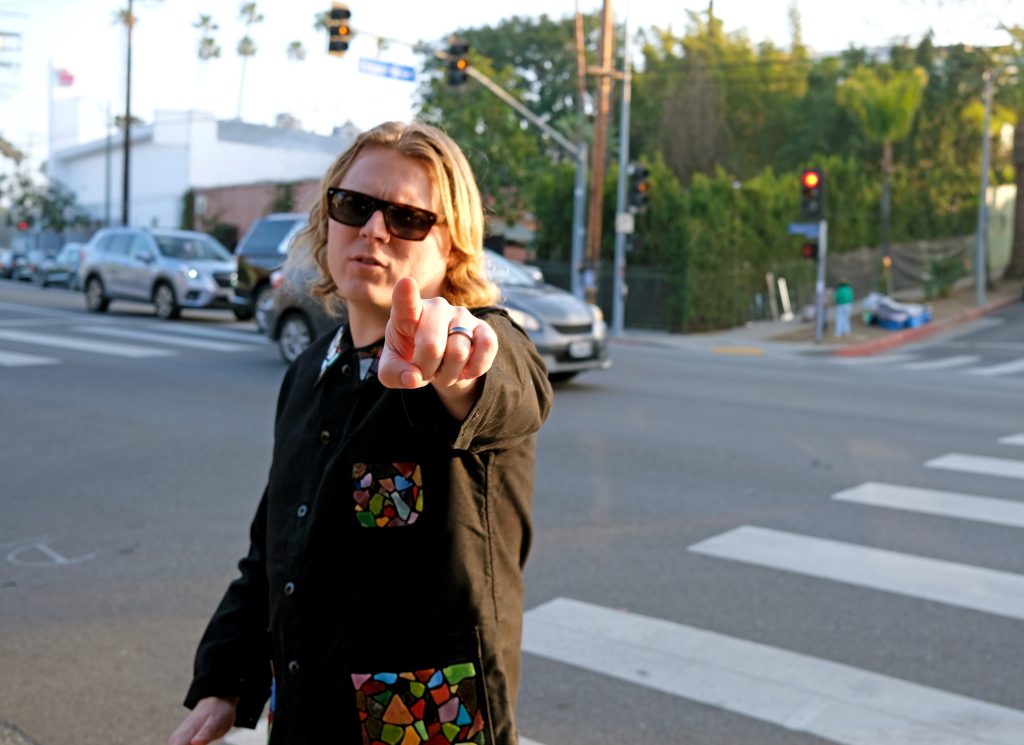
Ty Segall follows 2022’s acoustic introspection opus “Hello, Hi” with a deeper, wilder journey to the center of the self. With Three Bells, he’s created a set of his most ambitious, elastic songs, using his musical vocabulary with ever-increasing sophistication. It’s an obsessive quest for an expression that answers back to the riptide always pulling him subconsciously into the depths. Questions we all ask in our own private mirrors are faced down here—and regardless of what the mysterious “Three Bells” mean in the context of the album’s libretto, you can be assured that Ty’s ringing them for himself, and for the rest of us in turn. It’s a growing up and out of your head parable, but the farther out you get, the farther in you go. The two-headed suggestion of 2012’s Twins has grown ever more complex, as the outside/inside world of perception dissolves into a greater world of the senses—all six or seven of them! Since Ty deals in sounds, Three Bells rings with them most of all: sounds signaling the next phase, ringing to keep you stuck, or to set you free, with guitars like voices, questioning and answering the others in their turn. Since 2008, the singer/guitarist/puzzled panther we call Ty Segall has played out his hunger to be free over a dozen solo LPs and a series of other-named projects. In his music, freedom has taken the form of a rippling eclecticism in songs and production sounds, all of them conversing from album to album in a mad diversity of voices. Across the discograverse, 2014’s Manipulator and 2018’s Freedom’s Goblin precede Three Bells in double-album epicity, each unfurling its own multivarious tapestry in an atmosphere of gleeful octophenia, as Ty throws everything against the wall, delighting in how much he can stick there. With all fifteen songs brimming with perspectives, shape-shifting incessantly, not even waiting for a new song to work into the next idea, Three Bells steps into the shoes of both his previous doubles at the same time, designing finally to do the extended format justice. The acoustic songs of “Hello, Hi” had been a blast of fresh air; wanting another hit of that sweet air, Ty recognized that his body was craving to play the drums. This was a key that let him into the album— the songwriting happening on both guitar and drums. As the songs emerged, Ty pushed them out farther and farther compositionally, challenging the way they’d be played, then playing much of Three Bells in conversation with himself—a decision that further elevates the album’s conception. But you don’t get outside/inside all on your own—for Three Bells, Ty and Denée Segall collaborated on five of the songs. In Ty’s world, Denée forms the second self outside his self. And these selves radiate out into the world through other selves. Co-producer Cooper Crain, whose contributions to Harmonizer and “Hello, Hi” were deep, engineered and mixed most of the album, again bringing his individual vision into the process. Finally, some of the songs as written needed the kind of playing that Ty couldn’t get alone. On some numbers, Emmett Kelly’s bass parts not only addressed that need, but inspired the way the songs eventually went down. So it was when the Freedom Band was called in to play; their contributions transformed the material. Three Bells kind of goes beyond songs. The fifteen of them work together as a mosaic, creating the larger work at the same time as they stand on their own. Composing the album as a piece, Ty formed certain chord shapes over and over again, making thematic material that each song moves through in its own way, building a claustrophobic/paranoia vibe, cycling bold thrusts forward into ego deaths, the one-step-forward, two steps- back patterns framing an overriding ask: what we can do to get past the back-and-forth conversation, to arrive at a place of acceptance. Three Bells takes Ty Segall’s trips so much deeper and farther than they’ve gone before—a masterpiece of personal expression, expressed through words, music and production, parabolically addressing malaise with compassion in a flowing, unstoppable hour-plus of intoxicating sound.

Mikal Cronin (Solo)
Singer, songwriter, and multi-instrumentalist Mikal Cronin cut his musical teeth playing bass in garage punk bands and became a trusted and long-running member of Ty Segall‘s band; on his own he crafted music that was garage rock-inspired while also leaning toward power pop with a bit of folk-rock added for good measure. After two albums that honed this sound into something hooky and sleek, he looked to classic rock for inspiration on 2015’s MCIII, and by the time of 2019’s slickly produced and intricately arranged Seeker, Cronin was making music that sounded huge and mature, with almost no garage rock in its DNA.
Cronin was raised in Laguna Beach, California, where as a teenager he developed a passion for both surfing and rock & roll. While attending Laguna Beach High School, he and fellow student Ty Segall formed a dance-punk group called Love This. After graduating high school, Cronin left California for a few years to attend Lewis & Clark College in Portland, Oregon, to study psychology, but after seriously injuring his back he returned home to recover. The time off gave him a chance to evaluate his life choices, and after a couple semesters at community college, he transferred to California Institute of the Arts and began studying music. While attending school, he joined the surf-influenced garage band Charlie & the Moonhearts as their bassist; they became simply the Moonhearts after the departure of drummer Charlie Moothart, and in 2010 the band released a self-titled album through Tic Tac Totally Records. Cronin also began collaborating regularly with his high school chum Ty Segall, releasing a collaborative album, Reverse Shark Attack, in 2009 and playing bass in Segall‘s road band.
Cronin’s first solo album began as therapy after finally completing college and making his way into the real world. Full of noisy pop and garage influences, his self-titled LP (featuring guest appearances by Segall on drums, Moothart, and John Dwyer of Thee Oh Sees) was issued by Trouble in Mind Records in September 2011. While still playing with Segall, he released a second solo album, MCII, for Merge in the spring of 2013. Cronin embarked on a solo tour after that, taking time during 2014 to write and record his third album. Adding some new instruments to the fold, including the traditional Greek instrument the tzouras, and making a concerted effort to make his sound “bigger,” the album was split into halves, with one side straight-ahead pop songs and the other a thematically linked set of songs meant to tell Cronin’s coming-of-age story. The record, titled MCIII, was released by Merge in the spring of 2015.
After touring, Cronin devoted most of his musical time to playing with Ty Segall‘s live band and appearing on three of his friend’s albums, 2016’s Emotional Mugger, 2017’s Ty Segall, and 2018’s Freedom’s Goblin. When he turned back to his own music, he spent a month in a cabin located in Idyllwild, California, battling writer’s block and detailing recent heartbreak. When he was chased out of the hills by wildfires, he headed to the studio with Jason Quever of Papercuts to start recording. Backed by Segall‘s Freedom Band and inspired by the Beatles‘ White Album, Seeker was Cronin’s first album that bore no traces of garage rock or power pop, instead delving deeply into classic rock sounds. It was issued by Merge in October 2019. ~ Mark Deming & Tim Sendra, Rovi



